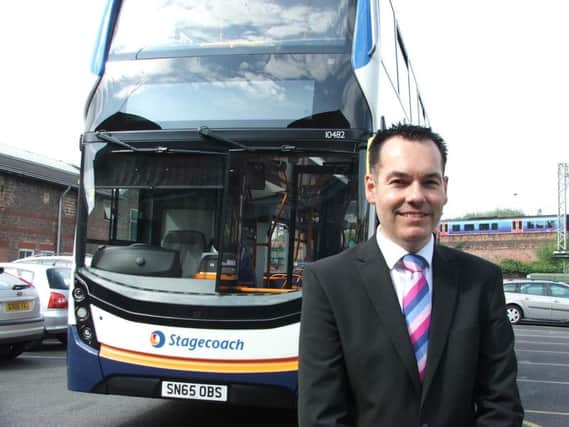Sheffield bus boss: 'Traffic in city is comparable to New York'


Matt Davies, managing director of Stagecoach Yorkshire - speaking on behalf of all the city's bus operators; Stagecoach, First and TM Travel, said research carried out by the Joseph Rowntree Foundation (JRF) made the 'wrong diagnosis' and said traffic was the main issue in the city.
The JRF called for a redesign of the Government’s transport, housing and economic policy, after its research revealed public transport was 'holding back' low-income families from achieving a better standard of living.
Advertisement
Hide AdAdvertisement
Hide AdSheffield South East MP Clive Betts said the cost of public transport was a 'major problem' in the city, while Ed Ferrari, one of the JRF report's authors, said reliability of bus services was also an issue across the city.
But Mr Davies said: "It's like a young inexperience doctor seeing an ill patient. The doctor knows there is a problem, but makes the wrong diagnosis, recommends the wrong treatment and actually makes the condition worse.
"This is the situation facing buses in Sheffield and many other places across the country."
Mr Davies said bus fares in Sheffield were the third-lowest in the country, with a special 50 per cent discount for job seekers and added there had been a multi-million pound investment in greener buses, multi-operator tickets and contactless technology.
Advertisement
Hide AdAdvertisement
Hide AdHe said: "JRF and others are right that there a problems. The problem is they've diagnosed the wrong cause.
"The biggest problem holding back buses and the citizens who rely on them is car congestion. That's not just my view, it's also the view of academics and other experts. Across Britain, the decline of bus use started in the 1950s and accelerated in the following three decades under a regulated publically owned system as car ownership grew and other social changes took hold. "Today, Sheffield is one of the most gridlocked cities in the UK, according to traffic analysts TomTom, with traffic jams comparable to those in New York. National research by Greener Journeys found that congestion has been causing bus speeds to slow down by on average 10 per cent per decade, causing bus patronage to decline by between 10 per cent and 14 per cent."That has a direct impact on the reliability of buses, pushes up the cost of running services, sees fares higher than they need to be and means bus journeys increasingly take more and more time."
Mr Davies urged politicians to take action after South Yorkshire Passenger Transport Executive had seen its budget cut by £30 million since 2013.He added: "Buses in Sheffield successfully take thousands of people to work every day. When buses are late, it’s almost always because they are stuck in the same congestion as cars.
"There is a clear economic, social and environmental case to give more priority to buses on the region's roads. If politicians are serious about delivering a better bus network for Sheffield, that's the policy prescription they should be writing now."